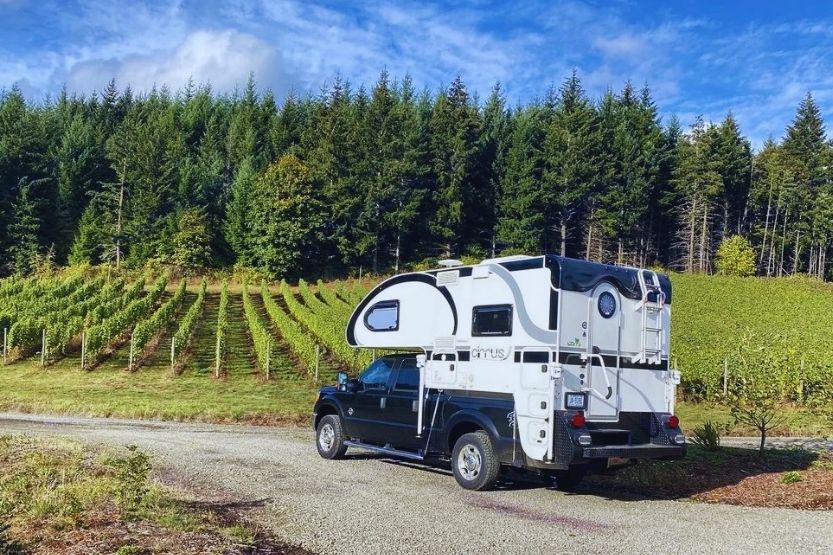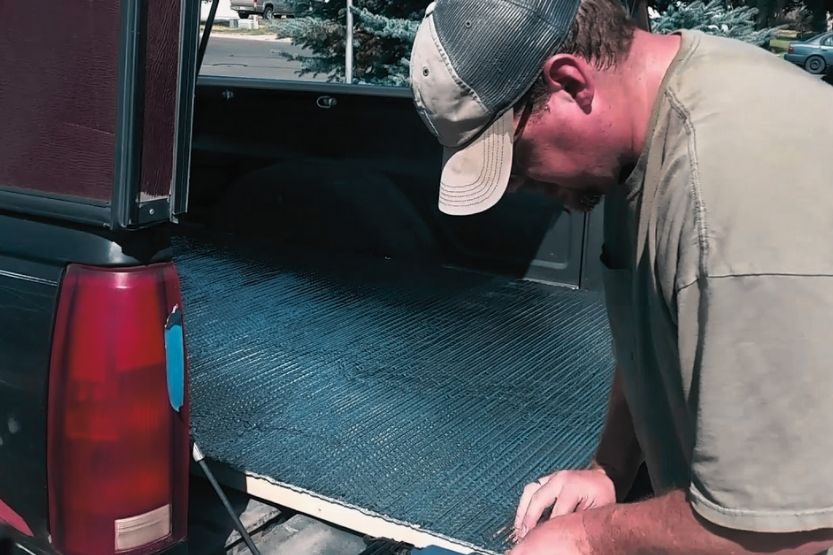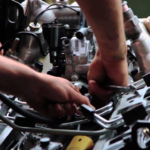Do you ever fantasize about living life on the road? If you’ve ever gone camping, you sure are familiar with the clamminess of waking up overheated in a tent scorching in the early sun. Yes, tents are fun, but what would it be like living in a truck camper shell?
A truck camper shell is a cost-effective option that will take your camping experience to the next level while living the RV life in a whole new way. If you are somebody who enjoys both and with a limited budget, a truck camper shell is your best bet. And perhaps the major benefits are affordability, versatility, and simplicity. It will change your lifestyle in ways you never thought possible.
Read on to learn more about the truck camper shell life, its pros and cons, and what it is like living in one full-time. Let’s get right into it!
What’s It Like Living in a Truck Camper Shell?

A Great Economical Solution
A camper shell is a great economical solution that will add utility to your truck. It will bring you closer to the RV experience, even if you have a limited budget. What makes it unique is its affordability, versatility, and simplicity.
Share Experiences with Other Truck Campers
Above all, you experience a sense of community when meeting with other truck campers by sharing experiences. You will be able to go to places you never knew existed.
Pack Everything You Need Into a Small Space
What makes it simple is that you can pack everything you need into a small space. Sleeping arrangements in camper shells can be as simple as a sleeping bag and pad or as complicated as futon mattresses, slide-out drawers, and built-in heaters.
Is a Truck Camper Shell Worth It?
Anyone who owns an open-bed pickup truck has probably had something fly out on the highway; a sensitive load is soaked in an unexpected rainstorm, theft of seemingly insignificant items, or garbage dumped into the bed.
Lockable, Weatherproof Storage Place for Cargo
A camper shell will transform your usually exposed truck bed into a lockable, weatherproof storage place for cargo or even oneself.
Even the most basic truck camper shell has locking handles on the back access door, which prevents the tailgate from opening if it isn’t locked.
Has Windows Which Provide Essential Ventilation
Many camper shells include opening windows, which provide essential ventilation, whereas enclosed tonneaus create gloomy tunnels conducive to mold growth. Camper shells are also equipped with weatherstripping, and you can caulk them with butyl tape or silicone caulk for added protection.
Lightweight Regular Camper Shell
The regular camper shell is lightweight (about 300 pounds), which is a perfect choice for half-ton and mid-size trucks with limited cargo capacity and provides cab-height clearance.
High-rise Shells Add Vertical Space
Shells with a high-rise add one to two feet of vertical space without the efficiency loss that awkward loads protruding over the cab usually cause.
Enables You to Use Roof Racks
Furthermore, camper shells allow you to use roof racks to mount oversized items that would otherwise not fit within the bed. Shell-mounted roof racks will come in handy when you can’t install cab-mounted ones.
Less Expensive Than Slide-in Campers
Above all, truck camper shells are less expensive than slide-in campers, and they’re a lot easier to set up, secure, stock, and drive.
Challenges of Living in a Truck Camper Shell
1. Restricted Space
For starters, space will be restricted, so you’ll have to make the most of every square inch. You can get around this problem by using extra storage alternatives.
2. Condensation
If you live in a truck camper shell, you may also experience condensation. This is because the ventilation of your truck canopy is usually ineffective, so you will need to have a waterproof truck camper shell.
3. Weather
The weather can be fickle at times, especially when traveling. The good news is that if you choose a watertight camper shell, water won’t seep into the truck topper and harm your stuff.
Best Truck Camper Shells
Now let’s take a look at the most convenient camper shells for your pickup truck:
1. Cirrus 820 Truck Camper
Perfect for 34-ton Pickup Trucks with 6-foot-long Beds
This one is perfect for 34-ton pickup trucks with 6-foot-long beds. It has unique features that will make your camp nights more than just relaxing. With its basic 210-watt solar kit installed, this camper shell has you covered for electrical power demands.
Equipped with Advanced Sleep System
It also has an advanced sleep system and a bathroom with a fold-down sink where you can clean up things.
Comes with a Wireless Camera
This camper shell comes with a wireless camera on the backside to help you when parking your truck. It also comes equipped with Bluetooth and a 19-inch TV.
Has Alde® Heater System
Furthermore, with the Alde® heater system, you will always have hot water.
2. Arctic Fox 1150 – Northwood
It is one of the best truck camper shells of all time. It is huge and has everything you need, with expanding sides and an over-cab sleeping area that makes a hotel suite look like a $10-dollar-motel.
Arctic Fox is specially designed for flatbed trucks and can accommodate three people. The durable support poles allow you to maintain the pod built when driving away in the truck and store the camper shell on a driveway when not in use.
3. Special Edition Dry Bath 8-11EX
It is a nice and wealthy camper shell and can fit on a 6.6-foot long short bed truck.
It includes a ten-foot side awning, a seven-foot power rear awning, thermal pane windows, a thermal skylight, and a one-hundred-watt solar panel.
4. Travel Lite RAYZR FB-M
Has a Compact Design
This one is a perfect choice if you are looking for homey comfort. You will have the luxury of owning a home on wheels with a compact design.
Allows for an Easily Removable All-weather Truck Camper
Its design allows for an easily removable all-weather truck camper that packs a lot of amenities into a small space.
This truck camper shell will tow right along with you everywhere to provide you with a place to sleep each night, whether you are an active rock climber, water rat, fisherman, or just a back-woods explorer.
5. Vagabond Outdoors – The Drifter
Made of Robust, Lightweight Aluminum
It is made of robust, lightweight aluminum that you can set up in 15 seconds and pack away in 30 to 60 seconds. It will allow you to go anywhere with ease.
Equipped with Insulated Ceiling and Waterproof Canvas Tent
The sleeping area is wedge-shaped, and with an insulated ceiling and waterproof canvas tent, you’ll be toasty warm even on the coldest nights in the woods.
Removable Bed
This camper shell allows you to maintain your bed area for customized storage. The bed is also removable, a great feature if you want to get creative.
Tips on How to Live in a Truck Camper Shell

1. Inspect Your Camper Shell’s Roof and Seals
You have heard this before, but the phrase “out of sight, out of mind” has some truth. Be proactive in checking for any problems when maintaining your truck camper. This is especially true for the roof and seals around your camper shell.
Moisture leaking into RVs and camper shells is a typical problem caused by poor weather stripping and seals. So, inspect the seals around your roof and windows every three months.
You almost certainly have a sealant issue if you spot loose pieces, water stains, or fractures. If that is the case, we recommend that you remove and re-seal your camper shell.
2. Check Batteries
Batteries should last three to five years if you care for them properly. You still have to check them regularly. A dead battery is the last thing you want because if it leaks, it disrupts your camping plans and leads to costly repairs.
A deep-cycle battery will lose its power after three to four years, so watching them is essential. Proper and safe storage is the way to go to prevent battery damage.
3. Water System Checks
When living in a truck camper shell, water is your most valuable resource, so ensuring that it’s clean and won’t clog your system is your number one priority.
Flushing the water system regularly is also necessary to avoid obstructions that could result in some costly repairs.
4. Run Your Generator
Allowing your generator to lie idle for an extended period can lead to its replacement years before it is necessary. Once your generator gets its usual operating temperature, you should run it for 15-20 minutes at least once a month to keep its internal components running at peak performance.
If you don’t do this, some of your generator’s components may corrode or rust, ultimately preventing it from working properly.
5. Take a Good Cooler
You will want to keep lunch meat, veggies, fruits, and other foods cold. So, it is good to include a cooler in your camper shell for essentials. You can even get a small refrigerator that runs on a second battery, so your primary battery doesn’t die.
Again, what is it like living in a truck camper shell? Living in a truck camper shell gives you the advantage of exploring remote locations while having a comfortable place to rest, eat, etc. You don’t have to build a tent and sleep on the ground.
Pros and Cons of Having a Camper Shell
Pros
1. Versatility
A truck camper shell is highly adaptable, and you can customize it to meet your specific needs.
You could be too high for some drive-thrus with an overhang with a truck camper, but you’ll still fit in their parking lots. You may not be able to park in multi-level parking garages, but you can still park on the street.
There is also a lot of flexibility, both in style and how you decorate it.
2. Separable
The fact that you can disconnect and separate the camper shell from the truck is a significant advantage that only camper trailers have. It is also useful when the camper shell needs expert servicing.
3. Durability
You won’t have to give our truck camper shell much thought when you detour off the beaten path. You don’t have to worry about getting stuck with a winch or traction pads.
However, that is not the case with many Class A motorhomes, Class B vans, and Class C RVs that navigate the pebbles and gravel with caution.
Camper shells also keep your stuff safe and secure. Your gear is easy to get to when you need it, and it’s kept out of harm’s way.
4. Self-contained
Despite its compact size, a camper shell has everything you need and leaves very little room for what you don’t.
Cons
1. Size
It isn’t easy to adjust to its size if you are used to living in a 3,000-square-foot home. Camper shells are very limited in size, both inside and out. You won’t keep anything that you don’t need or use daily.
You can get a larger camper shell with up to two slide-outs to navigate the space constraints. However, this will be at the expense of getting an even larger truck.
2. Tank Volume
Every inch of space counts in a cramped environment. So, truck camper manufacturers typically limit the volume of freshwater, greywater, and blackwater tanks.
You will need to use it wisely because tank capacity determines how long you can go off the grid and how often you need to use dump facilities.
4. Time-Consuming
Your average routine tasks will undoubtedly take longer than before when you live in a camper shell.
Does a Camper Shell Affect Gas Mileage?
A camper shell may or may not affect your truck’s gas mileage. It depends on you and how you are using the truck.
Some people say that driving with a camper shell increased their gas mileage by 1 mile per gallon. On the other hand, others claim that they began to use more fuel.
Perhaps those who claim that a camper shell improves their fuel economy have a truck that functions well with it. It is also important to note that camper shells weigh as much as humans.
So, while the design of the camper shell improves the curve of the back of the truck, the additional weight that comes with it could potentially cancel out all of that value.
But, the thing is, even if you lose a few miles per gallon, it’s not the end of the world. In most cases, it won’t be more than two gallons.
Common Issues With Truck Camper Shells

1. Weatherproofing
Camper shells are usually a trouble-free, semi-permanent addition to a truck. However, the most prevalent problem is weatherproofing, which can cause leaks in heavy rain. This is due to the shell’s design and fitment.
Add a Foam Layer Around the Camper Shell
The best way to weatherproof a camper shell is to add a foam layer around it. When crushed by a properly mounted and secured camper shell, this creates a robust seal against rain, dust, and wind.
Furthermore, because the adhesive is fastened to the bed rails rather than the camper shell, the camper shell will not be bonded to the truck bed. The quality of weatherstrip installation varies greatly amongst camper shell sellers and even within the same dealer, depending on who installs your shell.
2. Leak
Leaks might cause pooling inside one’s truck bed or harm delicate objects that the camper shell was there to protect in the first place if there is no weather stripping or if it is done poorly.
Use a Caulking Gun Loaded with Flexible, Outdoor-rated Caulk
So, the best thing to do here is to use a caulking gun loaded with flexible, outdoor-rated caulk and then run a bead down the truck bed rails where the leak happens.
Use a Plexiglas or Lexan as a Window
Moreover, while some people use plywood in place of a window to improve their camper shell, this will be unsightly.
So, cutting a sheet of Plexiglas or Lexan to size and mounting it to the shell using heavy-duty construction glue is the cheapest alternative that still preserves some function and aesthetic appeal to your camper shell.
Conclusion – Life in a Truck Camper Shell
Living in a truck camper shell is a rewarding experience. It has its pros and cons, just like any other lifestyle choice, but rest assured, it will give you a whole new outlook on life. It is a great economical solution that will bring you close to the RV life even when you are on a low budget.
You will treat it as if it were a conventional residence. You sleep, cook and clean in it. There is no better option than a camper shell setup if you plan on living in a truck full time.
All you have to do now is find a high-quality camper shell with all the typical amenities you need, and you’re good to go!
So, is it adventurous? Sure. Risky? Maybe, but that is the whole point. It’s to get out there and experience life differently.
Read next:
Toyota Camper Specs, Review, and History [Tacoma, Sienna, and more]

![Is Shell Gas Good for Your Vehicle? [Shell Gas Review] is shell gas good for your vehicle](https://roadsumo.com/wp-content/uploads/2022/03/is-Shell-gas-good-for-your-vehicle-150x150.jpg)







